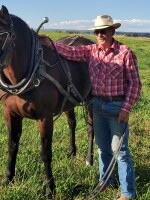Last week, U.S., Colorado Senators Michael Bennet, and John Hickenlooper and 15 of their bipartisan senate colleagues, pointed out that “a changing climate has further altered the natural pattern of droughts, making them more frequent, longer, and more severe." This group of senators are encouraging consideration of a farm bill that provides support to conserve water, improve watershed planning, upgrading water infrastructure and protecting land from erosion. They point out that during periods of drought, farmers and ranchers face lower crop and livestock outputs, which affects both producers and their communities and the broader food system. But at this point, members of the U.S. House of Representatives have less than two weeks to pass four appropriations bills. While these budget negotiations continue, progress on the next farm bill remains stagnant, and it may be March before members will begin work on reauthorizing a Farm Bill.
Irrigation water efficiency is important to farmers and ranchers in the Four Corners Region, and to assist producers, The Colorado Master Irrigator Program is offering a four session educational course starting on Thursday, January 18th from 8:30am to 4:30 pm, and continuing on January 25th, and February 1st and the 8th at the Arriolla Community Center. Topics include soil properties and water management, soil health, crop selection, enterprise analysis, and other topics to help farmers and ranchers apply irrigation water efficiently. The Registration fee is $100. Contact Emily Lockard at the Montezuma County County Extension Office for additional information by email at Emily.Lockard@colostate.edu or by calling 970-564-4170.
University of Missouri agricultural economist Scott Brown has some good news for cattle producers this winter. He points out that cattle markets are starting 2024 in a much better position than they were a year ago because as we have gone into the year, fed cattle prices are about $17 per hundredweight higher than the were at the start of 2023. He also report that feed costs are lower than a year ago, when corn was $7 a bushel and soybean meal was more than $500 a ton. Recent prices for these two feed components was $4.75 for corn and $435 for soybean meal, which may encourage cattle feeders to bid up calf prices this fall.
Mark Twain is reported to have said, “Everyone talks about the weather, but no one does anything about it.” That seems to be as true today as it was over a century ago, considering the fickle weather we’re living in. Last winter, the Four Corners Region was in a La Nina weather pattern that meteorologists predicted would result in a lack of snowfall in the region, but instead, we had a near record winter snowfall in much of the western U.S. Then weather patterns shifted to El Nino, which was expected to provide the region with above average precipitation through the fall and winter, but so far, we’ve had below normal snowfall, but meteorologists predict that we’ve likely reached the peak of El Nino in mid-January, and all global climate models are indicating that El Nino will decay this spring and we’ll move toward somewhere between a neutral or strong La Nina this summer, which is a rare weather phenomena.
Considering the frigid winter weather in much of the country over the past week or so, we probably should consider ourselves lucky with the weather we have received the last couple of weeks here in the Four Corners Region.



